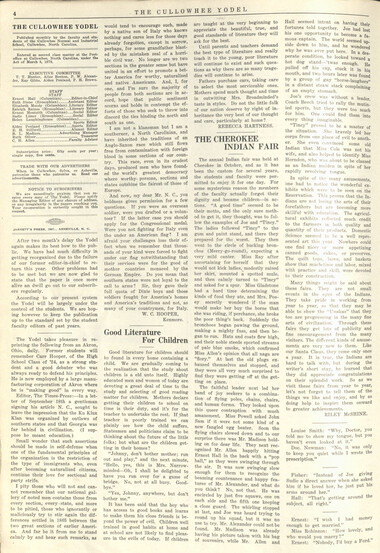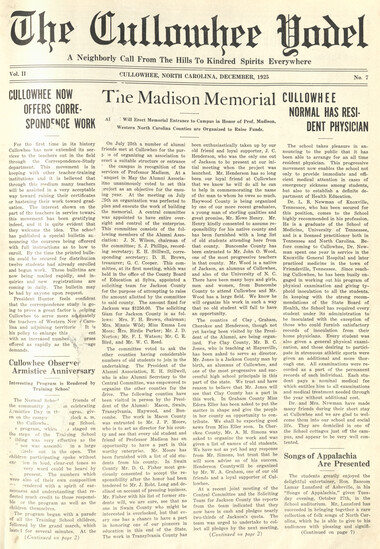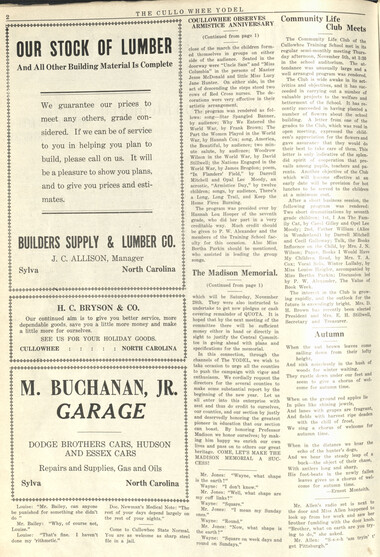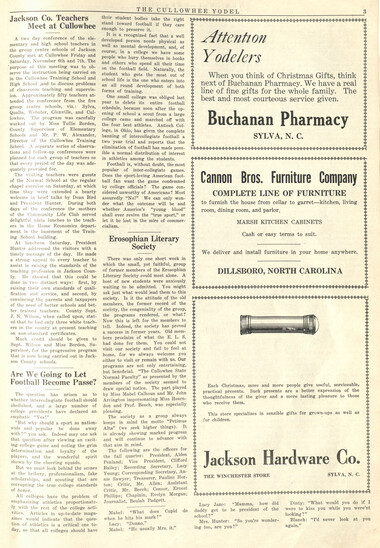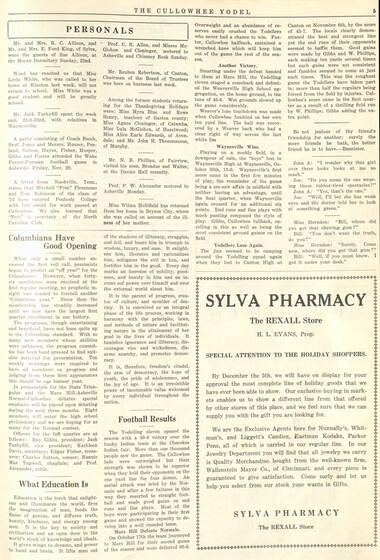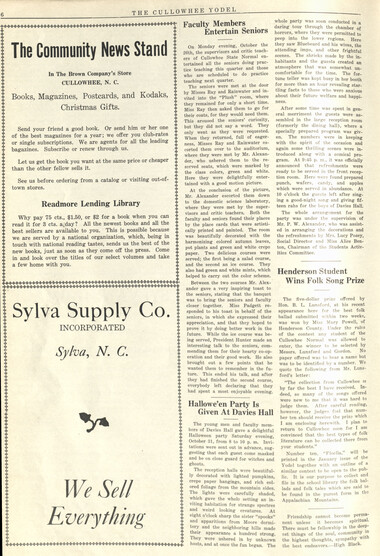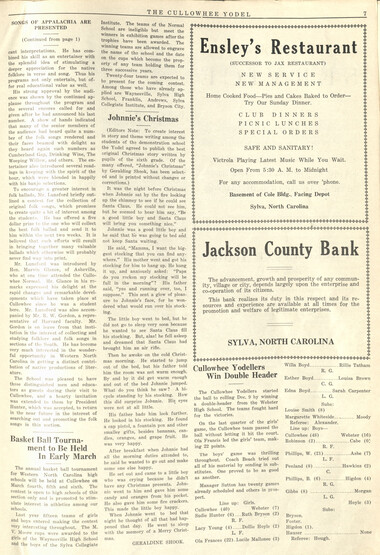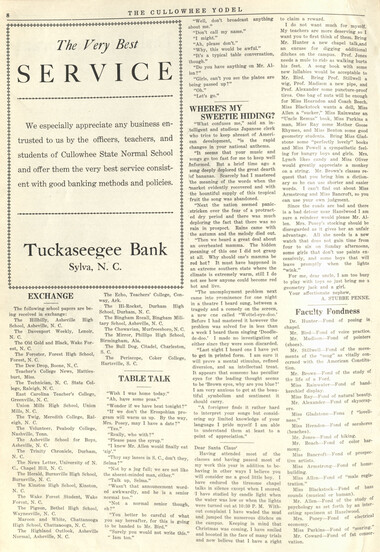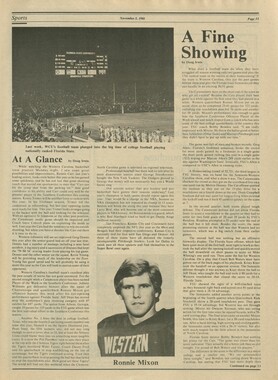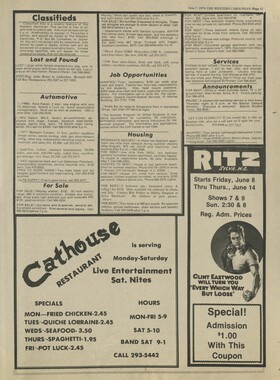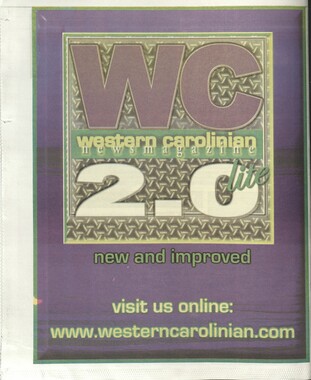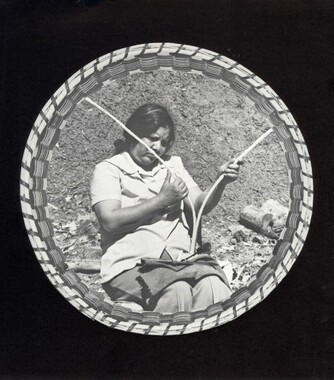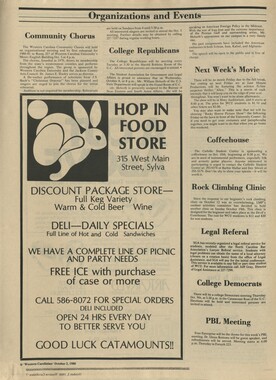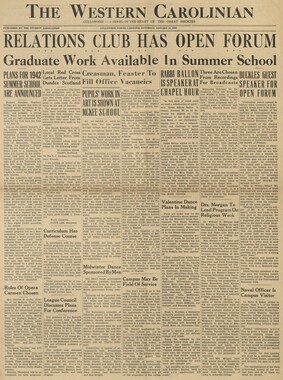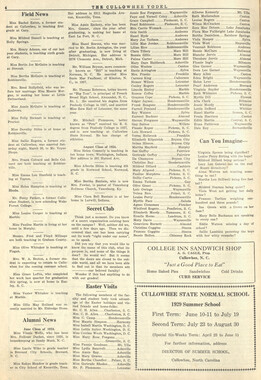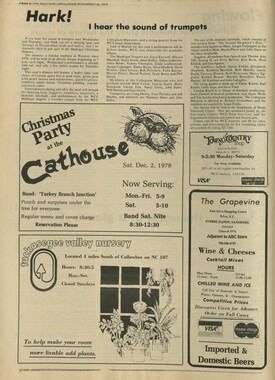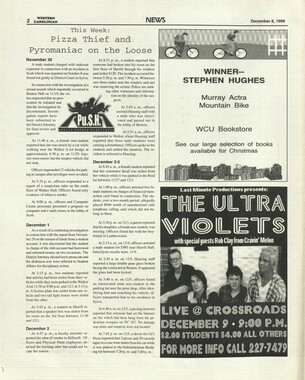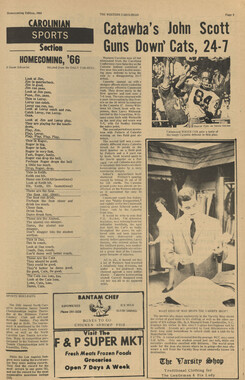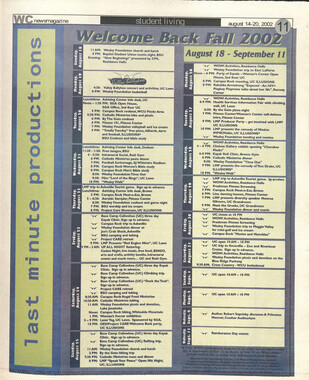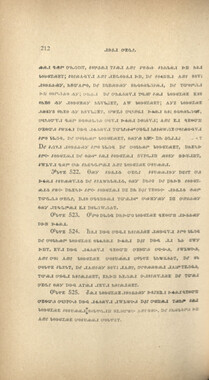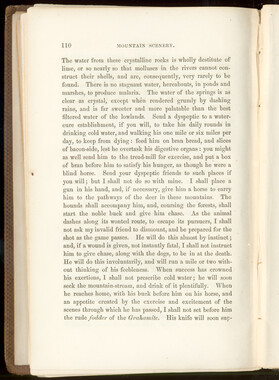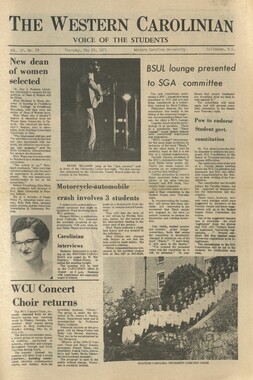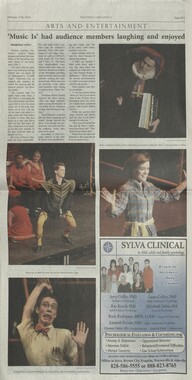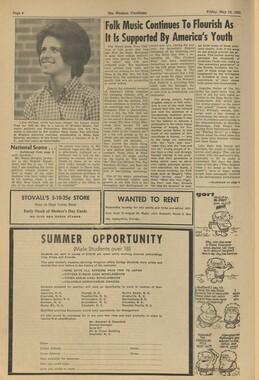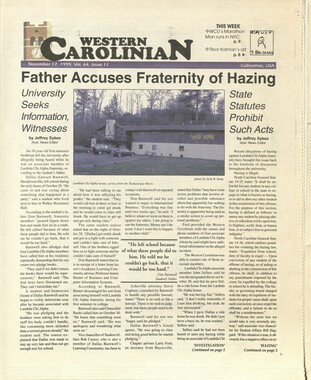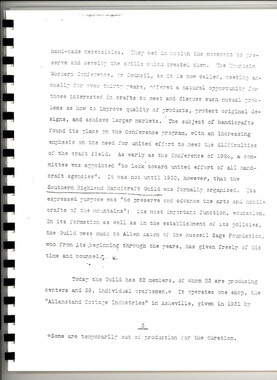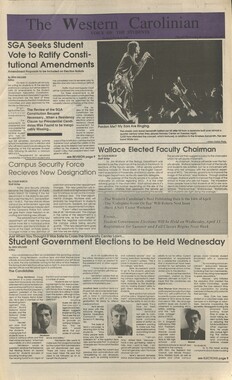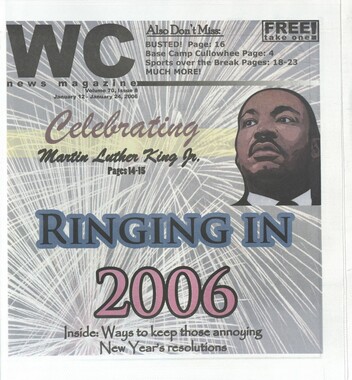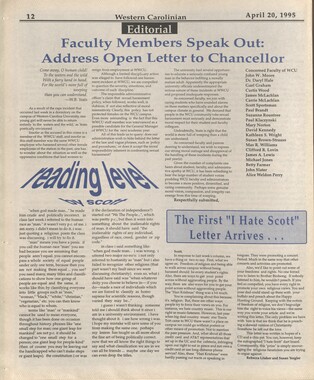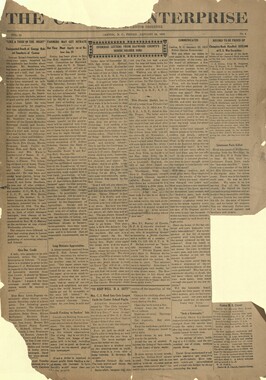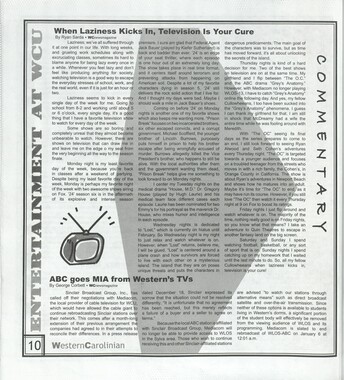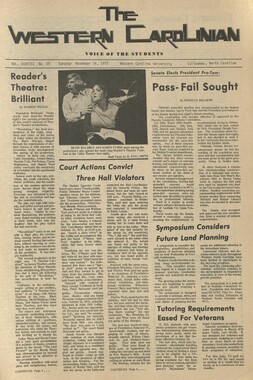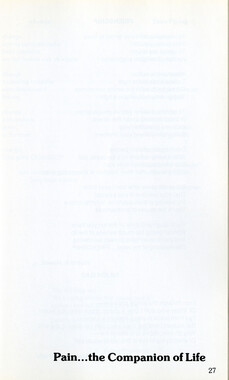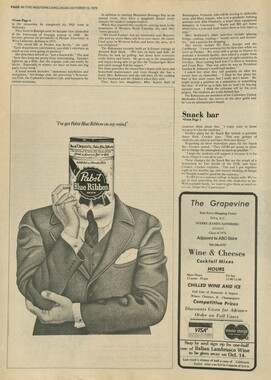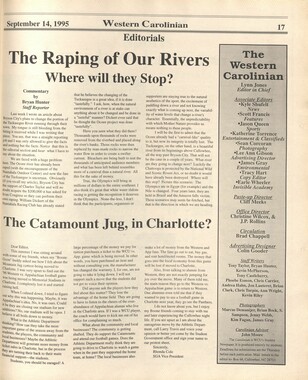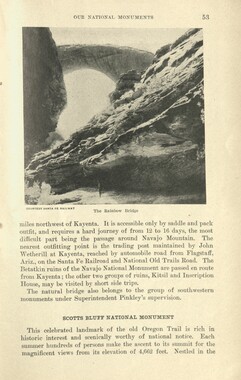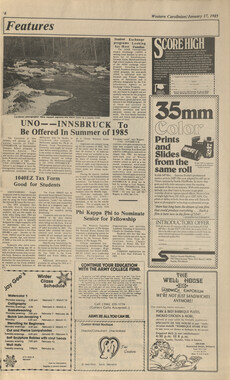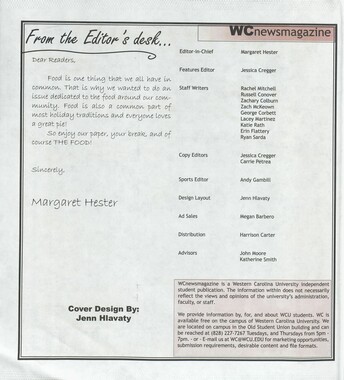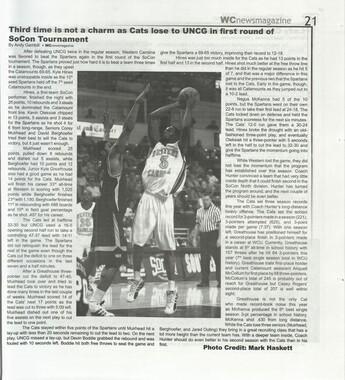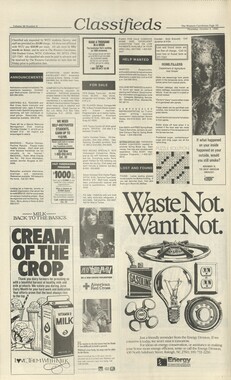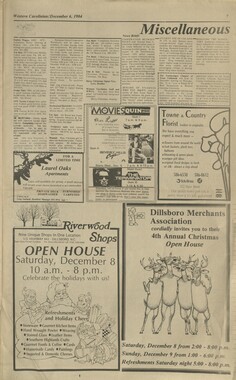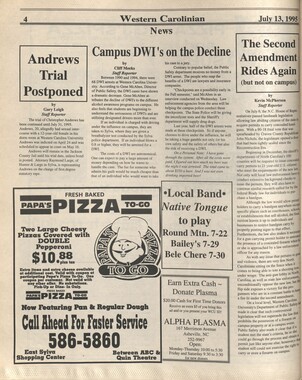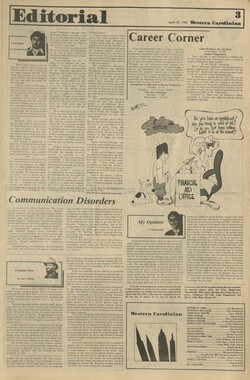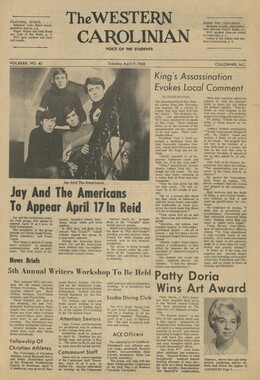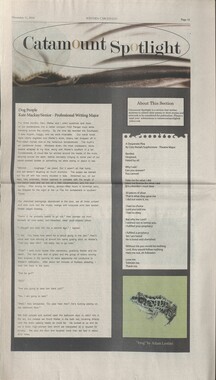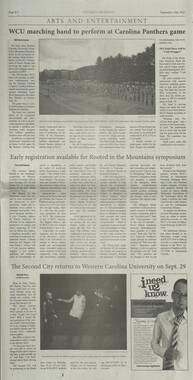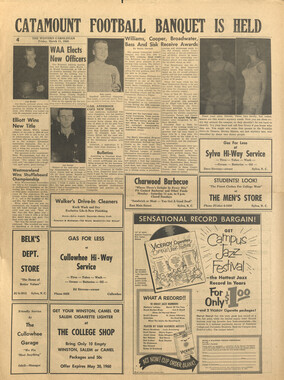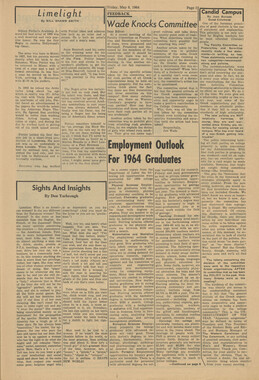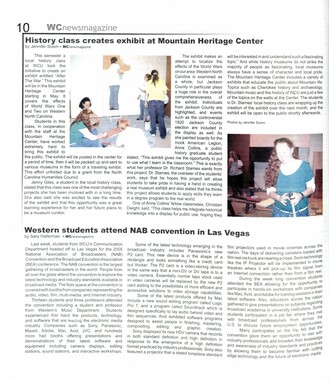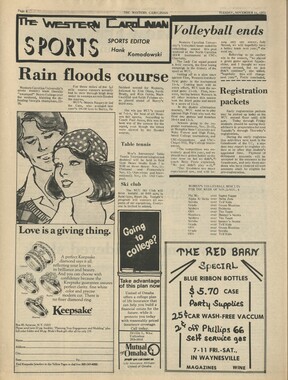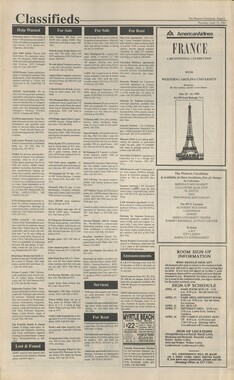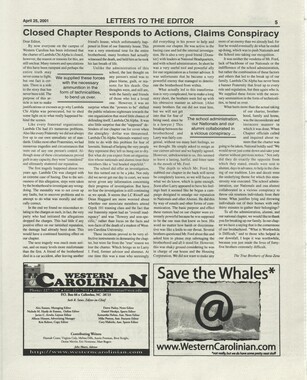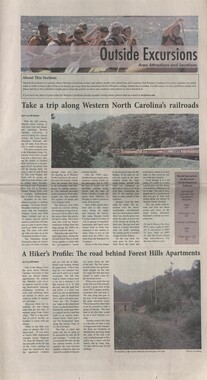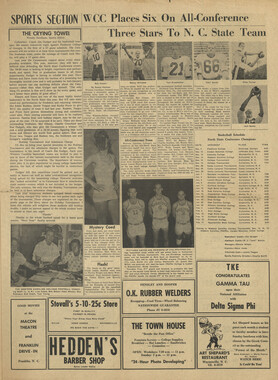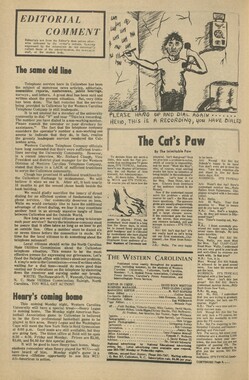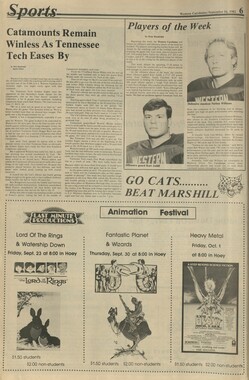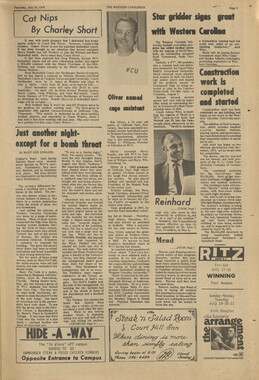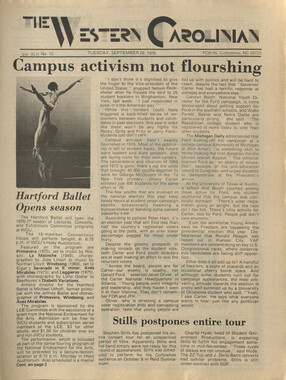Western Carolina University (21)
View all
- Canton Champion Fibre Company (2308)
- Cherokee Traditions (291)
- Civil War in Southern Appalachia (165)
- Craft Revival (1942)
- George Masa Collection (137)
- Great Smoky Mountains - A Park for America (3182)
- Highlights from Western Carolina University (422)
- Horace Kephart (998)
- Journeys Through Jackson (159)
- LGBTQIA+ Archive of Jackson County (90)
- Oral Histories of Western North Carolina (318)
- Picturing Appalachia (6617)
- Stories of Mountain Folk (413)
- Travel Western North Carolina (153)
- Western Carolina University Fine Art Museum Vitreograph Collection (129)
- Western Carolina University Herbarium (92)
- Western Carolina University: Making Memories (738)
- Western Carolina University Publications (2491)
- Western Carolina University Restricted Electronic Theses and Dissertations (146)
- Western North Carolina Regional Maps (71)
- World War II in Southern Appalachia (131)
University of North Carolina Asheville (6)
View all
- Allanstand Cottage Industries (62)
- Appalachian National Park Association (53)
- Bennett, Kelly, 1890-1974 (1463)
- Berry, Walter (76)
- Brasstown Carvers (40)
- Carver, George Washington, 1864?-1943 (26)
- Cathey, Joseph, 1803-1874 (1)
- Champion Fibre Company (233)
- Champion Paper and Fibre Company (297)
- Cherokee Indian Fair Association (16)
- Cherokee Language Program (22)
- Crowe, Amanda (40)
- Edmonston, Thomas Benton, 1842-1907 (7)
- Ensley, A. L. (Abraham Lincoln), 1865-1948 (275)
- Fromer, Irving Rhodes, 1913-1994 (70)
- George Butz (BFS 1907) (46)
- Goodrich, Frances Louisa (120)
- Grant, George Alexander, 1891-1964 (96)
- Heard, Marian Gladys (60)
- Kephart, Calvin, 1883-1969 (15)
- Kephart, Horace, 1862-1931 (313)
- Kephart, Laura, 1862-1954 (91)
- Laney, Gideon Thomas, 1889-1976 (439)
- Masa, George, 1881-1933 (61)
- McElhinney, William Julian, 1896-1953 (44)
- Niggli, Josephina, 1910-1983 (10)
- North Carolina Park Commission (105)
- Osborne, Kezia Stradley (9)
- Owens, Samuel Robert, 1918-1995 (11)
- Penland Weavers and Potters (36)
- Roberts, Vivienne (15)
- Roth, Albert, 1890-1974 (142)
- Schenck, Carl Alwin, 1868-1955 (1)
- Sherrill's Photography Studio (2565)
- Southern Highland Handicraft Guild (127)
- Southern Highlanders, Inc. (71)
- Stalcup, Jesse Bryson (46)
- Stearns, I. K. (213)
- Thompson, James Edward, 1880-1976 (226)
- United States. Indian Arts and Crafts Board (130)
- USFS (683)
- Vance, Zebulon Baird, 1830-1894 (1)
- Weaver, Zebulon, 1872-1948 (58)
- Western Carolina College (230)
- Western Carolina Teachers College (282)
- Western Carolina University (2008)
- Western Carolina University. Mountain Heritage Center (18)
- Whitman, Walt, 1819-1892 (10)
- Wilburn, Hiram Coleman, 1880-1967 (73)
- Williams, Isadora (3)
- Cain, Doreyl Ammons (0)
- Crittenden, Lorraine (0)
- Rhodes, Judy (0)
- Smith, Edward Clark (0)
- Appalachian Region, Southern (3032)
- Asheville (N.C.) (1945)
- Avery County (N.C.) (26)
- Blount County (Tenn.) (200)
- Buncombe County (N.C.) (1680)
- Cherokee County (N.C.) (283)
- Clay County (N.C.) (556)
- Graham County (N.C.) (247)
- Great Smoky Mountains National Park (N.C. and Tenn.) (535)
- Haywood County (N.C.) (3573)
- Henderson County (N.C.) (70)
- Jackson County (N.C.) (4926)
- Knox County (Tenn.) (61)
- Knoxville (Tenn.) (21)
- Lake Santeetlah (N.C.) (14)
- Macon County (N.C.) (421)
- Madison County (N.C.) (216)
- McDowell County (N.C.) (39)
- Mitchell County (N.C.) (135)
- Polk County (N.C.) (35)
- Qualla Boundary (982)
- Rutherford County (N.C.) (78)
- Swain County (N.C.) (2187)
- Transylvania County (N.C.) (270)
- Watauga County (N.C.) (12)
- Waynesville (N.C.) (86)
- Yancey County (N.C.) (72)
- Aerial Photographs (3)
- Aerial Views (60)
- Albums (books) (4)
- Articles (1)
- Artifacts (object Genre) (228)
- Bibliographies (1)
- Biography (general Genre) (2)
- Cards (information Artifacts) (38)
- Clippings (information Artifacts) (193)
- Copybooks (instructional Materials) (3)
- Crafts (art Genres) (622)
- Depictions (visual Works) (21)
- Design Drawings (1)
- Digital Moving Image Formats (2)
- Drawings (visual Works) (185)
- Envelopes (115)
- Exhibitions (events) (1)
- Facsimiles (reproductions) (1)
- Fiction (general Genre) (4)
- Financial Records (12)
- Fliers (printed Matter) (67)
- Glass Plate Negatives (381)
- Guidebooks (2)
- Internegatives (10)
- Interviews (823)
- Land Surveys (102)
- Letters (correspondence) (1070)
- Manuscripts (documents) (618)
- Maps (documents) (177)
- Memorandums (25)
- Minutes (administrative Records) (59)
- Negatives (photographs) (6192)
- Newsletters (1290)
- Newspapers (2)
- Notebooks (8)
- Occupation Currency (1)
- Paintings (visual Works) (1)
- Pen And Ink Drawings (1)
- Periodicals (194)
- Personal Narratives (10)
- Photographs (12977)
- Plans (maps) (1)
- Poetry (6)
- Portraits (4573)
- Postcards (329)
- Programs (documents) (181)
- Publications (documents) (2444)
- Questionnaires (65)
- Relief Prints (26)
- Sayings (literary Genre) (1)
- Scrapbooks (282)
- Sheet Music (2)
- Slides (photographs) (402)
- Songs (musical Compositions) (2)
- Sound Recordings (802)
- Specimens (92)
- Speeches (documents) (18)
- Tintypes (photographs) (8)
- Transcripts (329)
- Text Messages (0)
- A.L. Ensley Collection (275)
- Appalachian Industrial School Records (7)
- Appalachian National Park Association Records (336)
- Axley-Meroney Collection (2)
- Bayard Wootten Photograph Collection (20)
- Bethel Rural Community Organization Collection (7)
- Blumer Collection (5)
- C.W. Slagle Collection (20)
- Canton Area Historical Museum (2110)
- Carlos C. Campbell Collection (564)
- Cataloochee History Project (64)
- Cherokee Studies Collection (4)
- Daisy Dame Photograph Album (5)
- Daniel Boone VI Collection (1)
- Doris Ulmann Photograph Collection (112)
- Elizabeth H. Lasley Collection (1)
- Elizabeth Woolworth Szold Fleharty Collection (4)
- Frank Fry Collection (95)
- George Masa Collection (173)
- Gideon Laney Collection (452)
- Hazel Scarborough Collection (2)
- Hiram C. Wilburn Papers (28)
- Historic Photographs Collection (236)
- Horace Kephart Collection (861)
- Humbard Collection (33)
- Hunter and Weaver Families Collection (1)
- I. D. Blumenthal Collection (4)
- Isadora Williams Collection (4)
- Jesse Bryson Stalcup Collection (47)
- Jim Thompson Collection (224)
- John B. Battle Collection (7)
- John C. Campbell Folk School Records (80)
- John Parris Collection (6)
- Judaculla Rock project (2)
- Kelly Bennett Collection (1482)
- Love Family Papers (11)
- Major Wiley Parris Civil War Letters (3)
- Map Collection (12)
- McFee-Misemer Civil War Letters (34)
- Mountain Heritage Center Collection (4)
- Norburn - Robertson - Thomson Families Collection (44)
- Pauline Hood Collection (7)
- Pre-Guild Collection (2)
- Qualla Arts and Crafts Mutual Collection (12)
- R.A. Romanes Collection (681)
- Rosser H. Taylor Collection (1)
- Samuel Robert Owens Collection (94)
- Sara Madison Collection (144)
- Sherrill Studio Photo Collection (2558)
- Smoky Mountains Hiking Club Collection (616)
- Stories of Mountain Folk - Radio Programs (374)
- The Reporter, Western Carolina University (510)
- Venoy and Elizabeth Reed Collection (16)
- WCU Gender and Sexuality Oral History Project (36)
- WCU Mountain Heritage Center Oral Histories (25)
- WCU Oral History Collection - Mountain People, Mountain Lives (71)
- WCU Students Newspapers Collection (1923)
- Western North Carolina Tomorrow Black Oral History Project (69)
- William Williams Stringfield Collection (2)
- Zebulon Weaver Collection (109)
- African Americans (390)
- Appalachian Trail (35)
- Artisans (521)
- Cherokee art (84)
- Cherokee artists -- North Carolina (10)
- Cherokee language (21)
- Cherokee pottery (101)
- Cherokee women (208)
- Church buildings (190)
- Civilian Conservation Corps (U.S.) (114)
- College student newspapers and periodicals (2012)
- Dams (115)
- Dance (1023)
- Education (222)
- Floods (63)
- Folk music (1015)
- Forced removal, 1813-1903 (2)
- Forest conservation (220)
- Forests and forestry (1198)
- Gender nonconformity (4)
- Great Smoky Mountains National Park (N.C. and Tenn.) (181)
- Hunting (47)
- Landscape photography (25)
- Logging (122)
- Maps (83)
- Mines and mineral resources (9)
- North Carolina -- Maps (18)
- Paper industry (38)
- Postcards (255)
- Pottery (135)
- Railroad trains (72)
- Rural electrification -- North Carolina, Western (3)
- School integration -- Southern States (2)
- Segregation -- North Carolina, Western (5)
- Slavery (5)
- Sports (452)
- Storytelling (243)
- Waterfalls -- Great Smoky Mountains (N.C. and Tenn.) (66)
- Weaving -- Appalachian Region, Southern (280)
- Wood-carving -- Appalachian Region, Southern (328)
- World War, 1939-1945 (174)
Cullowhee Yodel Volume 02 Number 07
Item
Item’s are ‘child’ level descriptions to ‘parent’ objects, (e.g. one page of a whole book).
-
-
THE CULL OWHEE YODEL THE CULLOWHEE YODEL lished monthly by the faculty and e o£ the Cullowhee Normal and Industi , Cullowhee, North Carolina. EXECUTIVE COMMITTEE T. T. Hunter, Alice Benton, P. W. Alexander. Ray Gibbs, Alden Penland, F. H. Brown. STAFF STAFF Ernest Hall (Columbian) Editor-in-Chief Ruth Stone (Erosophian) Assistant Editor Elizabeth Moody (Columbian)-Literary Editor Rahisih Raines (Erosophian)-Literary Editor Ernest Monteith l Columbian ) ___Social Editor Sadie Limer (Erosophian) Social Editor Helen Laughinghouse (Columbian) -_ Sports Editor Mden Penland (Erosophian)__Sports Editor E. H. Stillwell Alumni Editor R. L. Madison Advertising Manager Ruth Oliver Treasurer C. H. Allen Faculty Advisor NOTICE TO SUBSCRIBERS are exceedingly anxious that you re- very copy of The Yodel. Please notify the Managing Editor of_any change of address, estly sought in this or any irregular After two month's delay the Yodel again makes its best bow to the public. We have had much difficulty in getting reorganized due to the failure of our former editor-in-chief to return this year. Other problems had to be met but we are now glad to state that the paper is once more alive an dwill go out to our subscribers regularly. According to our present system the Yodel will be largely under the control of the students. We are hoping however to keep the publication up to the standard set by the student faculty editors of past years. The Yodel takes pleasure in reprinting the following from an Akron, Ohio, daily. Former students will remember Carr Hooper, of the High School Class of '24, as a strong student and a good debater who was always ready to defend his principles. He is now employed by a large manufacturing corporation of Akron where he is "making good" in every way. Editor, The Times-Press:—In a letter of September 18th a gentleman signing his article N. C, sought to leave the impression that the Ku Klux Klan was organized by outlaws of southern states and that Georgia was far behind in civilization. (I suppose he meant education.) Small wonder that such assertions should be made in self-defense when one of the fundamental principles of the organization is the restriction of the type of immigrants who, even after becoming naturalized citizens, continue their love for sectional and party strife. I pity those who will not and cannot remember that our national gallery of noted men contains those from every section, every state, and more to be pitied, those who ignorantly or maliciously try to stir again the differences settled in 1865 between the two great sections of earlier America. And far be it from me to stand calmly by and hear such remarks, as would tend to encourage such, made by a native son of Italy who knows nothing and cares less for those days already forgotten, except in sorrow, perhaps, for some grandfather blasted by the mistaken zeal of a horrible civil war. No longer are we two sections in the greater sense but have united in an effort to promote a better America for worthy, naturalized and native Americans. And, I, for one, and I'm sure the majority of people from both sections are in accord, hope that public sentiment scorns and holds in contempt the efforts of those who seek to throw into discord the ties binding the north and south as one. I am not a klansman but I am a southerner, a North Carolinian, and have inherited the traditions of an Anglo-Saxon race which still flows free from contamination with foreign blood in some sections of our country. This race, even in its crudest days, produced men who have founded the world's greatest democracy where worthy- persons, sections and states outshine the fairest of those of Europe. And now,- my dear Mr. N. C, you boldness gives permission for a few questions. If you were an overseas soldier, were you drafted or a volunteer? If the latter case you should apply for the Congressional medal. Were you not fighting for Italy even tho under an American flag? I am afraid your challenges lose their effect when we remember that thousands of your kind were forced to fight under our flag notwithstanding that their services were for the good of mother countries menaced by the German Empire. Do you mean that southern states were not loyal to the call to arms? Sir, they gave their full quota of Dixie boys and those soldiers fought for America's homes and America's traditions and not, as many of your countrymen, for Italy. W. C. HOOPER, Ki are taught at the very beginning to appreciate the beautiful, true, and good standards of literature they will ask for the best. Until parents and teachers demand the best type of literature and really teach it to the young, poor literature will continue to exist and such questions as why there are so many tragedies will continue to arise. Fathers purchase cars, taking care to select the most serviceable ones. Mothers spend much thought and time in outwitting Mrs. Broadminded's taste in styles. Do not the little folk of our nation deserve by right of inheritance the very best of our thought and care, particularly at home? REBECCA HARTNESS. Good Literature For Children Good literature for children should be found in every home containing a child. We are gradually coming to the realization that the study about children is a eld unto itself. Highly educated men and women of today are devoting a great deal of time to the study and selecting of good reading matter for children. Mothers declare getting their children to school on time is their duty, and it's for the teacher to undertake the rest. If that teacher is poorly trained we can plainly see how the child suffers. Statesmen and politicians claim to be thinking about the future of the little folks; but what are the children getting in their homes? "Johnny, don't bother mother; run out and play," and the next minute, "Hello, yes, this is Mrs. Narrow- minded—Oh, I shall be delighted to have you run over for a game of bridge. No, not at all busy. Goodbye." "Yes, Johnny, anywhere, but don't bother me." It has been said that the boy who has access to good books and learns to make them his close friends is beyond the power of evil. Children well trained in good habits at home and at school are not likely to find pleasure in the evils of today. If children THE CHEROKEE INDIAN FAIR The annual Indian fair was held at Cherokee in October, and as it has been the custom for several years, the students and faculty were permitted to enjoy it for one day. For some mysterious reason the members of the faculty actually forgot their dignity and became children—in actions. "A good time" seemed to be their motto, and the only sure method to get it, they thought, was to follow the examples of Joe and "Tincy." The ladies followed "Tincy" to the gum and paint stand, and there they prepared for the worst. They then went to the circle of bucking bronchos (Merry-go-round), expecting a very mild canter. Miss Ray after ascertaining for herself that they would not kick ladies, modestly raised her skirt, mounted a spotted mule, and then calmly turned to "Tincy" and asked for a spur. Miss Gladstone had a hard time determining the kinds of food they ate, and Mrs. Posey secretly wondered if the man would make her buy the horse that she was riding, if perchance, she broke the poor thing's back. Suddenly _M bronchoes began pawing the ground, making a mighty fuss, and then began to run. Hats and coats flew high, and their noble steeds sported streams of pale blue smoke, which confirmed Miss Allen's opinion that all nags are "fiery." At last the old plugs ex- haused themselves and stopped, and they were all very much surprised to find they were getting off at the getting on place. The faithful leader next led her band of joy seekers to a combination of flying poles, chains, chairs, and human forms. They looked upon this queer contraption with much amazement. Miss Powell asked John Sam if it were not some kind of a new fangled egg beater. Soon the flying chairs slowed down and to our surprise there was Mr. Madison holding on for dear life. They next recognized Mr. Allen happily hitting Ernest Hall in the back with a "pop ball," as they were swinging through the air. It was now swinging slow enough for them to recognize the beaming countenance and happy features of Mr. Alexander, and what do you think? No, not that. He was encircled by just five squaws, one on each side and the fifth one keeping a close guard. The whirling stopped at last, and Joe was heard trying to round up his squad, but it was no use to try. Mr. Alexander could not be found. Mr. Madison was already having his picture taken with his bag of souvenirs, while Mr. Allen and Hall seemed intent on having their fortunes told together. Joe had lost his one opportunity to become a fa mous captain. The world seemed up" side down to him, and he wondered why he was ever put here. In a des perate condition, he looked toward a hot dog stand—'twas enough. He pulled off his cap, stuck it fa, his mouth, and two hours later was found by a group of gay "horse-laughers" in a distant straw stack complaining of an empty stomach. « was without a leader Coach Beech tried to rally the mutinied sports, but they were too much for him. One could find them into every thing imaginable. "Tincy" proved to be a master of the situation. She bravely led her corps from one place of evil to another. ^ She r\ some old Indian that Miss Cole was not his wtfe, and al o helped to identify Miss Beradon, who ■.-. about to be classed as an Indian maiden in spite of her rapidly revolving tongue. In spite of the many amusements, one had to notice the wonderful exhibits which were to be seen on the Reservation. Tl proves that the Indians are not losing the arts of their forefather! but are becoming more skillful with education. The agricultural exhibits reflected much credit to the farmers in both quality and quantity of their products. Domestic Science seemed to be a well represented art this year. Nowhere could one find nicei more appetizing canned goods, cakes, or preserves. The quilt tops, laces, and baskets show that much-time and labor, mixed with practice and skill, were devoted to their con tructiori. Many things mighl be said about these fairs. They are not small events in the eyes of the Indians. They take pride in working from year to year, so that they may be able to -how the "I'nakas" that they too are progressing in the many fine arts of civilization. Through these fairs they get lots of publicity and fine encouragemenl from the many visitor . The different kinds of amusements are very new to them. Like our Santa (lau . they come only once a rear. It is true, the Indians are hard to talk with, but during the writer's short .1.1; . he learned that they did appreciate congratulations on their splendid work. So as we visit these fairs from year to year, let's not forget to tell them of the things we like and enjoy, and by so doing help to inspire them onward to greater achievements. RILEY McSHINE. Louise Smith: "Why, Doctor, you told me to show my tongue, but you haven't even looked at it." Doc. Newman: "No, it was only to keep you quiet while I wrote the prescription." Fisher: "Instead of Joe giving Sudie a direct answer when she asked him if he loved her, he just put his arms around her." Hall: "That's getting around the subject, all right." Ernest: "I wish I had money enough to get married." Miss Robinson: "How lovely, and who would you marry?" „ Ernest: "Nobody, I'd buy a Ford.
Object
Object’s are ‘parent’ level descriptions to ‘children’ items, (e.g. a book with pages).
-
The Western Carolinian is Western Carolina University’s student-run newspaper. The paper was published as the Cullowhee Yodel from 1924 to 1931 before changing its name to The Western Carolinian in 1933.
-
